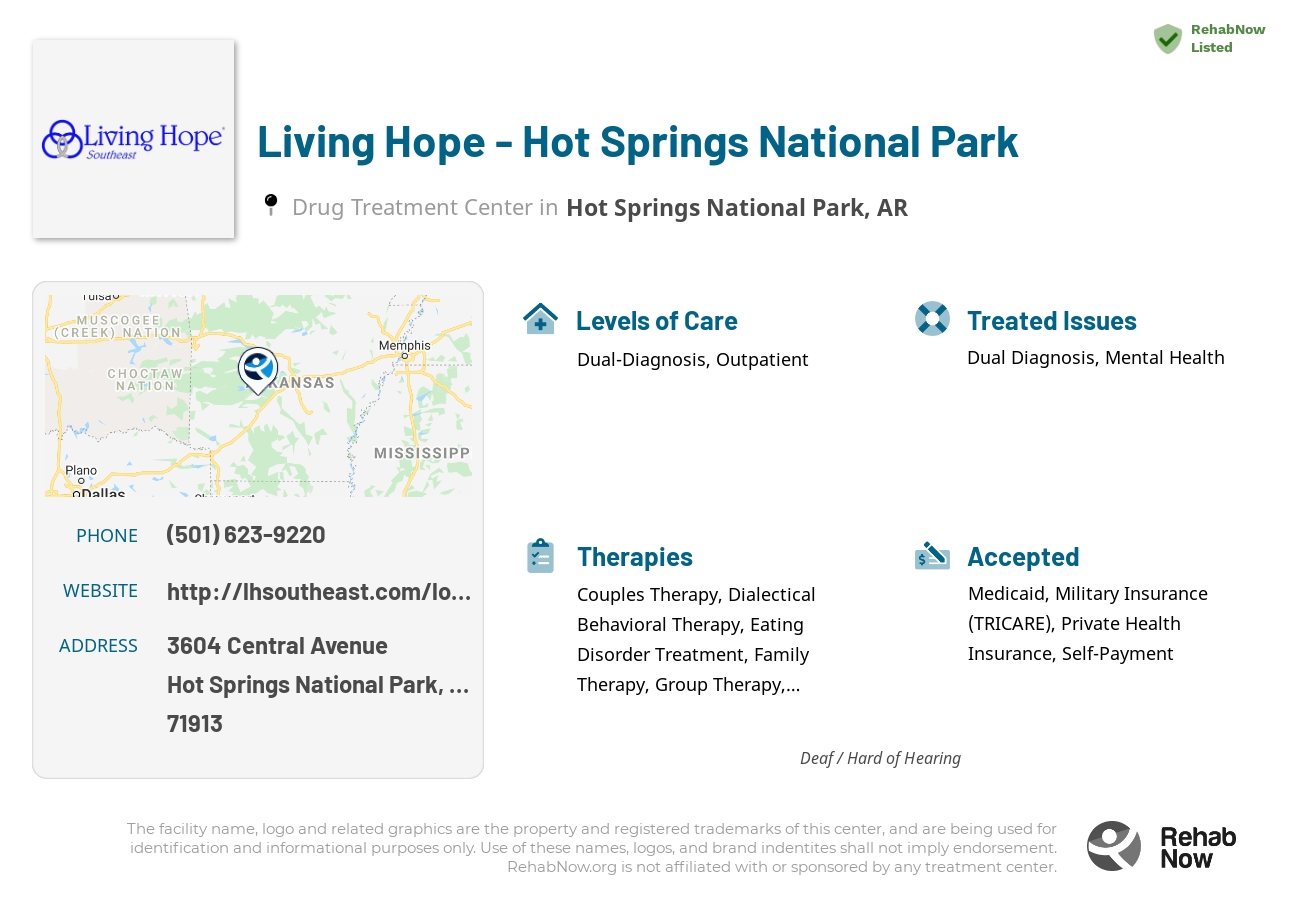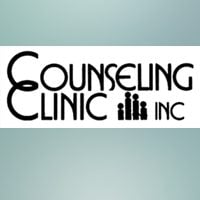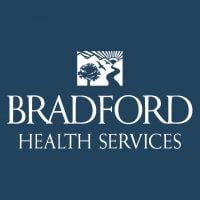Living Hope - Hot Springs National Park
Drug Rehab Center in Hot Springs National Park, Arkansas
Living Hope - Hot Springs National Park in Hot Springs National Park, Arkansas, is a highly regarded treatment facility offering specialized care for individuals with Dual Diagnosis, Eating Disorder, Mental Health, Addiction, Substance Abuse, and Alcoholism, including outpatient and detox programs, therapy, medication management, and support groups.
About Living Hope - Hot Springs National Park in Arkansas
Living Hope Southeast, situated in Hot Springs National Park, Arkansas, specializes in outpatient behavioral health and addiction recovery treatment for individuals of all ages. This facility stands out for its belief in treating mental illness with more than just therapy; it infuses hope into its comprehensive treatment plans. Flexible scheduling, dual diagnosis care, and a variety of therapy modes are among its unique offerings.
- Offers flexible scheduling to accommodate the needs of adults, children, and adolescents.
- Provides comprehensive dual diagnosis care for individuals facing both addiction and mental health challenges.
- Utilizes medication-assisted treatment (MAT) alongside traditional therapy to support recovery.
Living Hope Southeast is accredited by the Joint Commission on Accreditation of Healthcare Organizations (JCAHO), underscoring its commitment to high-quality care. The facility tailors outpatient programs to include individual, group, and family therapy, leveraging evidence-based approaches like cognitive-behavioral therapy (CBT) for effective treatment outcomes.
The facility addresses a range of issues, including drug addiction, substance abuse, and alcoholism, through various treatment methods such as MAT, recovery education, and relapse prevention. It focuses on providing a complete continuum of care from initial assessment to aftercare support, ensuring each client's needs are met throughout their recovery journey.
Genders
Ages
Modality
Additional
Accreditations

JCAHO
Conditions and Issues Treated
A drug rehab center that uses Dual Diagnosis is more likely to be successful in rehabilitating a person. Dual diagnosis helps to identify and treat any co-occurring disorders. It is essential to screen for both addiction and any untreated mental health issues. A dual diagnosis gives rehab the means to treat addiction while restoring mental and emotional health.
About 70% of patients with drug addiction have at least one other psychiatric diagnosis. Fortunately, dual diagnosis treatment is a proven model that has been highly effective.
Levels of Care Offered
This center offers a variety of custom treatment tailored to individual recovery. Currently available are Dual-Diagnosis, Outpatient, with additional therapies available as listed below.
Outpatient programs offer a lower intensity level of addiction treatment than inpatient facilities. They are ideal for those who have graduated from inpatient facilities, have a supportive home environment, and are motivated to commit to the program. Services offered include medication-assisted treatment, individual and group therapy, and peer group support.
This treatment is a popular option for those suffering from a lower intensity addiction. It is not advisable for someone who needs to go through a medically supervised detox or does not have a supportive home environment. It requires motivation and dedication to commit to the program without constant monitoring.
Therapies & Programs
During individual therapy at Living Hope - Hot Springs National Park in , the person in recovery meets with a therapist one on one to go over their situation and learn from past mistakes. The counselor or therapist will use this time to address the causes of addiction, triggers, and any mental issue or dual diagnosis. They will also address aftercare plans, giving them the best chances of long-term sobriety.
This therapeutic process is very intense and challenging to go through. Some clients may find it easier to open up with someone apart from their family or loved ones who understand their struggles and experience with addiction.
The process of going through couple’s therapy at Living Hope - Hot Springs National Park in allows for both partners to be on the same page regarding addiction recovery. Whether one or both members of the couple struggled with addiction, they can improve their odds of sobriety by undergoing this treatment together. This therapeutic environment teaches how to communicate effectively and avoid relapse triggers while building healthy lifestyles that may help maintain sobriety following graduation from rehab programs.
Family therapy is designed to help addicts get clean and sober by using what they love the most; their family. Most drug treatment centers make it mandatory that the addict’s family attend therapy sessions, which is great because having everyone there to support them makes it much easier for them to get clean. Not only are they surrounded by people who want them to get better, but everyone is there because they want the best for them, not because they feel like they have to be.
Drug addicts are often surrounded by resentful or uneducated family members who would, at times, rather see them stay addicted because it makes their own lives easier. Sometimes they don’t understand what the addiction is or how they play a part in it. They know that during and after the addict’s sobriety journey, they will face challenges and changes that they aren’t sure how to handle. This can be very tough for an addict to go through on their own, which is why it’s so important that they have the support of their family. Just because someone is an addict does not mean that they don’t deserve the love and support of those around them.
Addicts in Hot Springs National Park, AR can find support in group therapy at Living Hope - Hot Springs National Park by finding peers who understand their situation and being held accountable. They also learn to develop faith, understanding, and insight into their addiction through shared conversations.
Group Therapy is employed by drug treatment centers to provide the recovering addict with a platform to talk about their feelings and experiences. It also provides for an opportunity to learn from other addicts who have successfully overcome their addiction. It is recommended that all group members be recovering addicts for this type of therapy to work.
Trauma therapy allows people who struggled with a past trauma to face the situation and learn from it. Many people go through traumatic events at an early age that later leads them into addiction as adults. By addressing this issue during treatment at Living Hope - Hot Springs National Park in [/type], you can move forward with your recovery process and take back control of your sober future, too!
Traumas are one of the most common causes of psychological disorders such as Addiction Disorder. It’s often found among those diagnosed with Addictive Disorders because traumatized individuals have strong emotions or thoughts related to their traumas, leading to addictive behaviors.
Dialectical behavior therapy (DBT) is a cognitive-behavioral therapy that focuses on eliminating specific negative thoughts, such as suicidal thoughts. These negative thoughts can potentially lead to an individual inflicting self-harm. It helps treat patients exhibiting uncontrollable emotions, intense mood swings, and borderline personality disorders.
The term “Dialectic” means the integration of opposites. In substance abuse, DBT refers to accepting the patient’s addiction and working to change their thoughts and behavior. It improves life skills such as controlling intense emotions without reacting impulsively, resolving interpersonal conflicts effectively, and promoting awareness about self and others.
Cognitive Behavioral Therapy (CBT) helps addicts comprehend the causes of their substance abuse and the consequences that follow. The treatment’s goal is to help addicts gain self-control and maintain abstinence from drugs and alcohol over the long term. Through CBT, clients learn to recognize and avoid high-risk situations and cope with challenging situations when they arise.
Payment Options Accepted
For specific insurance or payment methods please contact us.
Is your insurance accepted?
Ask an expert, call (888) 674-0062
Living Hope Associated Centers
Discover treatment facilities under the same provider.
Learn More About Living Hope Centers
Additional Details
Specifics, location, and helpful extra information.
Hot Springs National Park, Arkansas 71913 Phone Number(501) 623-9220 Meta DetailsUpdated April 15, 2024
Staff Verified
Living Hope - Hot Springs National Park Patient Reviews
There are no reviews yet. Be the first one to write one.
Hot Springs National Park, Arkansas Addiction Information
Arkansas has one of the highest rates of substance abuse and addiction in the nation for drug overdoses. Methamphetamines and prescription opioids are by far the most widely abused drugs in the state. Despite the high rates, Arkansas ranked only 25th in the for drug overdose deaths in 2013.
About 2,213 people struggle with addiction to drugs or alcohol in Hot Springs National Park. This means about 10% of the population is addicted to these substances. The most commonly abused drugs in the state are marijuana, opioids, and methamphetamine. Counseling can provide individuals with tools to cope with triggers and cravings, and medication-assisted treatment uses medication to help alleviate withdrawal symptoms and reduce the risk of relapse.
Treatment in Nearby Cities
- Hoxie, AR (160.7 mi.)
- Sherwood, AR (53.3 mi.)
- Russellville, AR (56.2 mi.)
- Mena, AR (67.7 mi.)
- West Point, AR (96.7 mi.)
Centers near Living Hope - Hot Springs National Park
The facility name, logo and brand are the property and registered trademarks of Living Hope - Hot Springs National Park, and are being used for identification and informational purposes only. Use of these names, logos and brands shall not imply endorsement. RehabNow.org is not affiliated with or sponsored by Living Hope - Hot Springs National Park.










